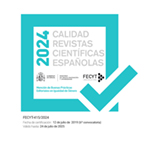Medialab Prado as a citizen laboratory in the technocultural, urban and architectural context
Abstract
Medialab Prado was an international reference institution dedicated to the democratisation of technoculture. Instead of adopting a traditional exhibition model, it promoted cultural production as an open and permeable process. This article explores the elements that made this space unique, underlining the importance of the relationship between its architecture, spatial management and citizen laboratories. Starting with a brief history of its origin, it delves into the evolution of the laboratory concept to the citizen laboratory model, analysing its technocultural, urban and architectural context. Furthermore, its spatial properties are explored in dialogue with the ideas of an ‘open city’ proposed by Richard Sennett (2019) in Building and living: Ethics for the city, concluding with the key learnings that emerge from this emblematic case.
Downloads
Publication Facts
Reviewer profiles N/A
Author statements
- Academic society
- N/A
- Publisher
- Grupo de Investigación Cultura Digital y Movimientos Sociales. Cibersomosaguas
Article download
License
In order to support the global exchange of knowledge, the journal Teknokultura is allowing unrestricted access to its content as from its publication in this electronic edition, and as such it is an open-access journal. The originals published in this journal are the property of the Complutense University of Madrid and any reproduction thereof in full or in part must cite the source. All content is distributed under a Creative Commons Attribution 4.0 use and distribution licence (CC BY 4.0). This circumstance must be expressly stated in these terms where necessary. You can view the summary and the complete legal text of the licence.
















